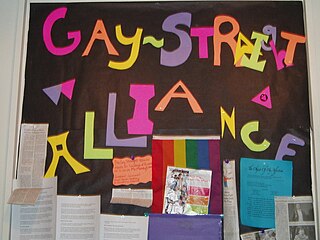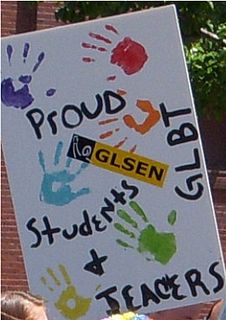Gay bashing and gay bullying is an attack, abuse, or assault committed against a person who is perceived by the aggressor to be gay, lesbian, bisexual, or transgender. The attack may be physical or verbal. This can also include abuse, bullying or assaults perpetrated against a heterosexual person whom the attacker perceives to be LGBT.
Queer studies, sexual diversity studies, or LGBT studies is the education of topics relating to sexual orientation and gender identity usually focusing on lesbian, gay, bisexual, transgender, gender dysphoria, asexual, queer, questioning, intersex people and cultures.

A promenade dance, commonly called a prom, is a dance party for high school students. It may be offered in semi-formal black tie or informal suit for boys, and evening gowns for girls. This event is typically held near the end of the school year. There may be individual junior and senior proms or they may be combined.

A Gay–Straight Alliance, Gender-Sexuality Alliance (GSA) or Queer–Straight Alliance (QSA) is a student-led or community-based organisation, found in middle schools, high schools, colleges, and universities. These are primarily in the United States and Canada. Gay–straight alliance is intended to provide a safe and supportive environment for lesbian, gay, bisexual, transgender, and all (LGBTQ+) children, teenagers, and youth as well as their cisgender heterosexual allies. In middle schools and high schools, GSAs are overseen by a responsible teacher. The first GSAs were established in the 1980s. Scientific studies show that GSAs have positive academic, health, and social impacts on schoolchildren of a minority sexual orientation and/or gender identity. Numerous judicial decisions in United States federal and state court jurisdictions have upheld the establishment of GSAs in schools, and the right to use that name for them.

A straightally or heterosexual ally is a heterosexual and/or cisgender person who supports equal civil rights, gender equality, and LGBT social movements, challenging what they perceive as homophobia, biphobia, and transphobia, even though not everyone who meets this definition identifies as one.

LGBT culture is a culture shared by lesbian, gay, bisexual, transgender, and queer individuals. It is sometimes referred to as queer culture, while the term gay culture may be used to mean "LGBT culture" or to refer specifically to homosexual culture.
The origin of the LGBT student movement can be linked to other activist movements from the mid-20th century in the United States. The Civil Rights Movement and Second-wave feminist movement were working towards equal rights for other minority groups in the United States. Though the student movement began a few years before the Stonewall riots, the riots helped to spur the student movement to take more action in the US. Despite this, the overall view of these gay liberation student organizations received minimal attention from contemporary LGBT historians. This oversight stems from the idea that the organizations were founded with haste as a result of the riots. Others historians argue that this group gives too much credit to groups that disagree with some of the basic principles of activist LGBT organizations.
Outright Vermont is Vermont's only queer youth service organization. Its mission is to build a Vermont where all LGBTQ+ youth have hope, equity and power.

The questioning of one's sexual orientation, sexual identity, gender, or all three is a process of exploration by people who may be unsure, still exploring, or concerned about applying a social label to themselves for various reasons. The letter "Q" is sometimes added to the end of the acronym LGBT ; the "Q" can refer to either queer or questioning.
LGBT movements in the United States comprise an interwoven history of lesbian, gay, bisexual, transgender and allied movements in the United States of America, beginning in the early 20th century and influential in achieving social progress for lesbian, gay, bisexual, transgender and transsexual people.
LGBT linguistics is the study of language as used by members of LGBT communities. Related or synonymous terms include lavender linguistics, advanced by William Leap in the 1990s, which "encompass[es] a wide range of everyday language practices" in LGBT communities, and queer linguistics, which refers to the linguistic analysis concerning the effect of heteronormativity on expressing sexual identity through language. The former term derives from the longtime association of the color lavender with LGBT communities. "Language", in this context, may refer to any aspect of spoken or written linguistic practices, including speech patterns and pronunciation, use of certain vocabulary, and, in a few cases, an elaborate alternative lexicon such as Polari.

LGBT sex education is a sex education program within a school, university, or community center that addresses prominent sexual health topics among LGBT groups. Within schools, topics on LGBT sexual health are usually integrated into the general sex education courses.
The Mississippi Safe Schools Coalition (MSSC) is an organization in Mississippi that promotes safe schools for Lesbian, Gay, Bisexual, Transgender, Queer, or young people who are mistakenly perceived to be queer. The group was founded in 2008 and has already hosted events such as: the Mississippi Safe Schools Coalition Queer & Allies Summit and the Second Chance Prom. The Second Chance Prom was made famous due to Constance McMillan not being able to wear a tuxedo or take her girlfriend to the prom.

Historically speaking, lesbian, gay, bisexual, and transgender (LGBT) people have not been given equal treatment and rights by both governmental actions and society's general opinion. Much of the intolerance for LGBT individuals come from lack of education around the LGBT community, and contributes to the stigma that results in same-sex marriage being legal in few countries (31) and persistence of discrimination, such as in the workplace.
Straight pride is a slogan that arose in the 1980s and early 1990s that has primarily been used by social conservatives as a political stance and strategy. The term is described as a response to gay pride adopted by various groups in the early 1970s, or to the accommodations provided to gay pride initiative.
The Hayward Gay Prom is a dance held for LGBT youth. It takes place in Hayward, California every year, and was established in 1995.
Homophobia in ethnic minority communities is any negative prejudice or form of discrimination in ethnic minority communities worldwide towards people who identify as–or are perceived as being–lesbian, gay, bisexual or transgender (LGBT), known as homophobia. This may be expressed as antipathy, contempt, prejudice, aversion, hatred, irrational fear, and is sometimes related to religious beliefs. While religion can have a positive function in many LGB Black and Minority Ethnic (BME) communities, it can also play a role in supporting homophobia.
Students identifying as LGBTQIA+ have a long, documented history at Brigham Young University (BYU), and have experienced a range of treatment by other students and school administrators over the decades. Large surveys of over 7,000 BYU students in 2020 and 2017 found that over 13% had marked their sexual orientation as something other than "strictly heterosexual", while the other survey showed that .2% had reported their gender identity as transgender or something other than cisgender male or female. BYU is the largest religious university in North America and is the flagship institution of the educational system of The Church of Jesus Christ of Latter-day Saints. Historically, experiences for BYU students identifying as LGBTQIA+ have included being banned from enrolling due to their romantic attractions in the 60s, being required by school administration to undergo electroshock and vomit aversion therapies in the 1970s, having nearly 80% of BYU students refusing to live with an openly homosexual person in a poll in the 1990s, and a ban on coming out until 2007. Until 2021 there were not any LGBTQIA+ - specific resources on campus, though there is now the Office of Student Success and Inclusion. BYU students are at risk of discipline and expulsion by the Honor Code Office for expressions of same-sex romantic feelings that go against the school's code of conduct such as same-sex dating, hugging, and kissing, for gender non-conforming dress, and students and faculty are still banned from meeting together in a queer-straight alliance group on campus.
LGBT psychology is a field of psychology of surrounding the lives of LGBTQ individuals, in the particular the diverse range of psychological perspectives and experiences of these individuals. It covers different aspects such as identity development including the coming out process, parenting and family practices and support for LGBTQ individuals, as well as issues of prejudice and discrimination involving the LGBTQ community.

Shaneel Shavneel Lal is a Fijian-New Zealand LGBT rights activist, known for spearheading the movement to ban conversion therapy in New Zealand. Lal is a model, a columnist for New Zealand Herald, and a political commentator. Lal is a trustee of Adhikaar Aotearoa, a non-profit that provides education, support and advocacy for queer South Asians. Lal has served as an executive board member of RainbowYOUTH and Auckland Pride Festival.







